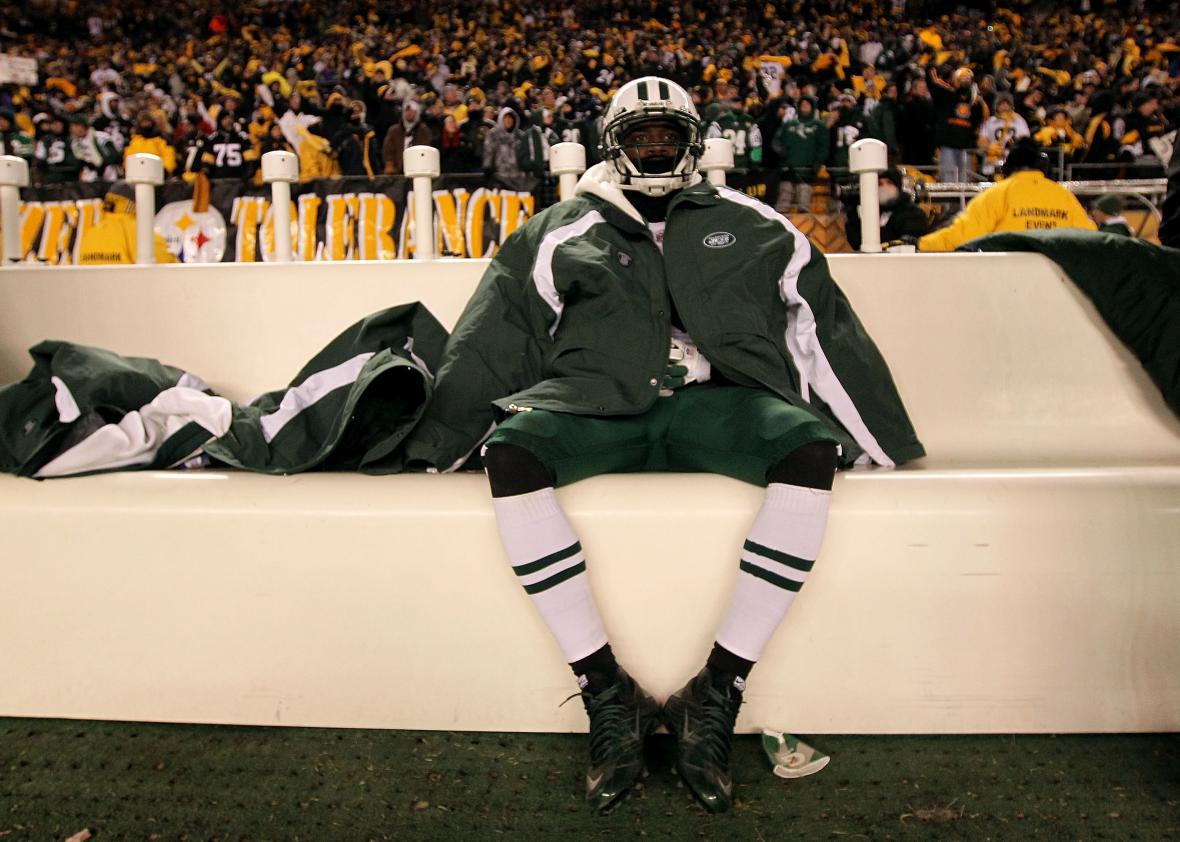The man who shot and killed former NFL player Joe McKnight in Louisiana on Thursday was released for undisclosed reasons, Jefferson Parish Sheriff Newell Normand said in a press conference on Friday.
The shooting death of McKnight—who is black—and release of the shooter Ronald Gasser—who is white—has caused outrage on social media among social justice activists and McKnight’s former teammates.
Gasser admitted to shooting McKnight according to police accounts of the incident, which reportedly stemmed from a case of road rage. During the odd press conference, Normand attempted to beat back against what he said were false rumors about the incident as well as any speculation that there was a racial component to Gasser’s release. But he struggled to explain why—when Gasser has admitted to the shooting death—the police had not at least chosen to keep him in custody.
“We felt as of last night out of an abundance of caution we did not want to get to that threshold in that point in time,” Normand said of the decision not to arrest the shooter. “People can Monday Morning Quarterback what we’ve done.
“Mr. Gasser is not going anywhere, he has been completely cooperative with us in every request that we have made. So that’s not the issue. Simply put the issue at the end of the day is that we will do a very thorough and deliberate investigation.”
Again, this vague description of the reasoning behind the decision did not really clarify why the shooter was let go. Normand did say that he did not want to release any additional details because it might “taint” an ongoing investigation.
“There are still witnesses that we are looking for and I do not want to be accused of tainting this investigation or suggesting a story about this investigation to witnesses that we have not located and talked to,” Normand said.
The details, however, that Normand did feel comfortable revealing would seem to have been beneficial to Gasser, or at least were defensive against claims that Normand’s office had acted inappropriately out of any sort of racial prejudice.
“I would strongly suggest that you stop believing what you’re reading,” he said, citing several reports that depicted the shooting as a cold-blooded assassination.
Nola.com had previously reported that a witness claimed it had been an execution-style killing:
A witness, who declined to give her name, said she saw a man at the intersection yelling at McKnight, who was trying to apologize. The man shot McKnight more than once, the witness said. She said he shot McKnight, stood over him and said, “I told you don’t you f— with me.” Then the man fired again, she said.
Normand directly contradicted this account, saying that the three shell casings were found in Gasser’s car, which would indicate that he fired from his automobile into McKnight’s and not when he was standing over him. The coroner Gerald Cvitanovich said McKnight was shot three times in the hand, shoulder, and chest, and the wounds were inconsistent with what the witness described to Nola.com.
“We have no witness account of an apology being made by Mr. McKnight to Mr. Gasser so that did not occur,” Normand said, without explaining why this information wouldn’t potentially taint other future witness accounts.
“I’ve been already accused of dropping the ball … because we released Mr. Gasser last evening after we took his statement,” Normand said, adding, “I can’t go into the details as why that is at this point in time, but I can tell you I can’t wait for the moment so that I can set the record straight.”
The sheriff was adamant that Gasser was not released because he is white and McKnight was black.
“Look, the easiest thing for me would have been ‘book him, Dano.’ Right? But the fact of the matter is that in trying to flush out these details in how it relates to all of this and not having that rush to judgment and doing this in a very deliberate and appropriate fashion we chose not to do that,” he said. “Of course, where that leads us in this point and time is that everybody wants to make this about race. This isn’t about race.”
In a bizarre aside, Normand then went on to say that “the gentleman that raised Joe McKnight Jr. used to work for this office” as a deputy.
While the sheriff implied that he needed a more complete investigation to determine whether criminal charges against Gasser were appropriate, he clearly had probable cause to hold a man who admitted to shooting and killing another man. But, it was revealed in the course of the press conference, the office released Gasser before they even completed McKnight’s autopsy. At the same time, Normand said his office hadn’t yet determined whether Gasser had a concealed handgun permit when they let him go, and that Gasser had a 10-year-old criminal issue, but “I’m not sure of all the details of that.”
So, again, it seems like the shooter was released before a lot of potentially relevant information about the case was ascertained.
When Normand was asked whether there were issues surrounding Louisiana’s “Stand Your Ground” law that affected the case, he seemed to start to say yes before cutting himself off. “It is one of the issues that looms on the horizon as it relates to—I’d rather not opine on that at this time,” he said.
George Zimmerman was famously acquitted of shooting and killing unarmed teenager Trayvon Martin after using Florida’s “Stand Your Ground” statute as a defense.
When asked whether the shooting was being investigated as a possible hate crime, Normand said, “We have nothing of any witness that reveals anything to us at this point in time to suggest that.”
